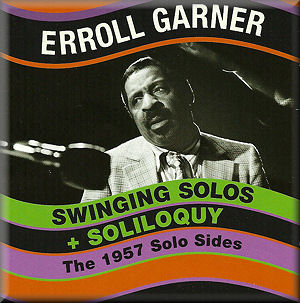1. Until the Real Thing Comes Along
2. Stumbling
3. Don't Get around Much Anymore
4. You Go to my Head
5. One Night of Love
6. You'd Be So Nice to Come Home To
7. No More Time
8. I Surrender Dear
9. If I Had You
10. Don't Take Your Love from Me
11. Soliloquy
12. The Music Goes `round and `round
13. My Silent Love
Erroll Garner - Piano
Al Hall - Bass (track 13)
Specs Powell - Drums (track 13)
When watching or listening to the Erroll Garner Trio, I often felt sorry for the bassist and drummer (especially the drummer), as they had so little to do, yet they had to keep on eagle eye on Garner as one could never tell what he would do next. In any case, with a left hand able to play as strongly as Garner's, who needed a bassist or drummer?
In a way, the recordings here solve that problem by capturing Erroll playing entirely alone. This works very well, as Garner was a sort of one-man-band, able to sound like a whole orchestra with the richness of his chordings. Most of these solo tracks were recorded in 1957 but track 12 comes from 1952 and the last track is actually a trio performance from 1956.
Most of Erroll's early performances were shortish, keeping within the three-minute limit imposed by 78rpm records. But here he has the time to stretch out, and all the 1957 tracks clock in at more than four-and-a-half minutes. Until the Real Thing Comes Along is a typically buoyant piece, with Garner's trademark left and right hands setting up that unique rhythmic indeterminacy. The tune also displays Erroll's ability to vary the dynamics to create contrast, balancing sweet against hot.
Stumbling is absolutely astonishing. Its five-note motif can sound corny but in Garner's hands the tune becomes a riot of invention. Just when you think he has improvised on this song as far as he can go, he starts up again with more amazing (and often witty) variations, worrying the melody like a dog worries a rat - but much more creatively. You Go to my Head is an even more prolonged (nine minutes!) version. Garner prolongs the ending, adding one new decorative phrase after another to generate a wondrous cadenza-type coda. The pianist clearly relishes the chance to explore each number as long as he likes.
One Night of Love (the title-track from a 1934 movie - a tune based on a Puccini duet) allows Garner to play about with tempos, switching unpredictably from ballad to waltz, bombastic drama to tender romance, eventually moving in and out of that familiar Garneresque bounce. Again, he can't seem to leave the ending alone.
These first five tracks comprised the original LP Swinging Solos, which also contained the solo The Music Goes 'round and 'round and (inexplicably) the 1956 trio version of My Silent Love. The remainder of this CD was originally released under the title Soliloquy, starting with some typical Garnerisms on You'd Be So Nice to Come Home To (the mystifying introduction, the lilting left hand, the mid-stream modulations), followed by a tranquil Garner original - No More Time.
In I Surrender Dear, Garner plays all kinds of naughty tricks with the tune, including going into stride piano for a while and trying a bit of pseudo-classical playing. If I Had You starts with a particularly misleading introduction lasting more than 90 seconds. Garnr interpolates I'll Get By into the melody.
The tune Soliloquy has a hint of Erroll's favourite mambo rhythm and plenty of that sustain pedal which he liked so much and used so effectively. Few jazz musicians would touch a novelty song like The Music Goes 'round and 'round but Garner has a field day with it, juggling its key, its chords and its tempo. My Silent Love proves what I said at the start of this review: the bass and drums are largely inaudible and virtually superfluous. But it's still a marvellous track, with some breathtaking piano.
This album confirms what I have often thought: that Erroll Garner was a phenomenon - an adult prodigy.
Tony Augarde
